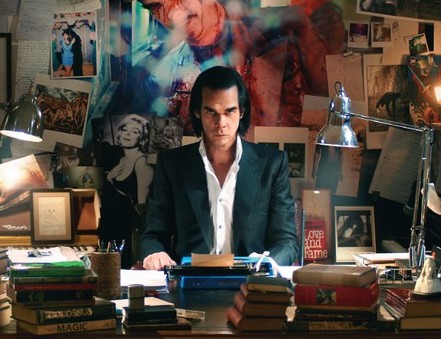 Opening theatrically in the US and UK this week, 20,000 Days on Earth unpicks the personal and creative life of the magnetic and prolific singer, songwriter, author, and laureate of dread Nick Cave via a dramatized day in which he takes a song from typewriter to concert hall. Incorporating staged encounters between the artist and people who figure in his story (a shrink, his kids, Kylie Minogue), the film “is a documentary only in the sense that it is about a real person,” as UK daily The Telegraph put it in a weekend profile of the artist. Yet it has been consistently programmed as such by festivals and feted as such by critics.
Opening theatrically in the US and UK this week, 20,000 Days on Earth unpicks the personal and creative life of the magnetic and prolific singer, songwriter, author, and laureate of dread Nick Cave via a dramatized day in which he takes a song from typewriter to concert hall. Incorporating staged encounters between the artist and people who figure in his story (a shrink, his kids, Kylie Minogue), the film “is a documentary only in the sense that it is about a real person,” as UK daily The Telegraph put it in a weekend profile of the artist. Yet it has been consistently programmed as such by festivals and feted as such by critics.
That says a lot about the evolution of documentary, and about evolving perceptions of the form. In 1988 the solons of the Academy Awards doc committee infamously blackballed Errol Morris’ The Thin Blue Line because it contained dramatic recreations. This past January Iain Forsyth and Jane Pollard’s collaboration with Cave, a film that is more or less entirely staged, won the directing and editing awards in the world documentary category at Sundance. While its notion of reality might yet prove a little too elastic for Oscar, no one (save perhaps the literal-minded folks at The Telegraph) really questions what kind of film this is.
You’d be on shakier ground classifying any of the movies below as proper docs, but all share with 20,000 Days on Earth the essential conceit of inserting musical artists into fictionalized stories about themselves, in pursuit of some elemental “truth” about their life, work, or standing in the world. Ever since A Hard Day’s Night music films have played with the porous boundary between fancy and fact – maybe because pop itself is so entwined with fantasy and myth; maybe because it’s just fun imagining that we’re getting a peek behind the curtain, even if through a gauze of fiction. Hence these six quasi/pseudo/hybrid/mock docs on musical themes.
1. Head (1968, dir. Bob Rafelson)
Long before it occurred to Nick Cave to play a version of himself onscreen, the Monkees played versions of the versions of themselves they’d been playing on TV for two years. Part psychedelic sketch comedy, part meta-doc, part biting commentary on the Monkees’ twilight reality as pop idols trapped by the imperatives of their prefab origins, Head was met upon release with confusion and hatred. Now it plays as presciently postmodern, and funny as hell. (Head will be shown in November at the Leeds International Film Festival – details at the fest website after the full program is announced in early October.)
2. ABBA: The Movie (1977, dir. Lasse Hallstrom)
ABBA’s big-screen foray dresses up a concert film in a fictional story, anticipating This Movie Is Broken and Metallica Through the Never but not those films’ pretensions. Hallstrom, who went from making ABBA videos to making Hollywood Oscar bait, said the paper-thin plot – concerning the misadventures of a hapless Aussie DJ trying desperately to land an interview with the Swedish pop colossi as they tour Oz – was “conceived on the plane on the way to Australia.” But then anybody who watches ABBA: The Movie is there for the hits, not for narrative sophistication, and to their credit the filmmakers knew it.
3. Rude Boy (1980, dir. Jack Hazan and David Mingay)
God bless the Clash, but they couldn’t act, which actually serves the documentary verisimilitude of this shambling, thinly fictionalized snapshot of end-of-the-’70s punk trying to figure out what to do with itself. Rude Boy inserted Ray Gange, a non-actor Clash pal “playing” a beery fan-turned-crap roadie, into the ongoing reality of the band on tour and in the studio (recording Give ‘em Enough Rope
4. Year of the Devil (2002, dir. Petr Zelenka)
A wry, philosophical take on addiction, stardom, spirituality, and spontaneous combustion masquerading as the phony origin story of a real Prague trad-rock outfit, Cechomor. Their rise from funeral band to festival headliners, as shaped by beloved Czech folk bard Jaromir Nohavica and devilish Killing Joke front-terror Jaz Coleman and supposedly documented by a Dutch filmmaker, makes for deft deadpan comedy with unexpected stabs of grace that resonate even if your knowledge of Czech culture doesn’t extend beyond Pilsner Urquell.
5. The True Legend of Tony Vilar (2006, dir. Guiseppe Gagliardi)
Calabrian folk-punk dynamo Peppe Voltarelli traverses the Americas from Buenos Aires to the Bronx in search of his childhood idol, Tony Vilar, an Italian crooner who achieved fame in Argentina before disappearing in the mid-’60s, supposedly to escape the humiliation of having his toupee snatched off by a fan. A half-real, half-imagined road-trip mockumentary that portrays the Italian diaspora through a broadly comic musical lens.
and … I’m Still Here (2010, dir. Casey Affleck)
Less a mockumentary than a documentary of an extended, Andy Kaufman-esque performance art piece ostensibly aimed at deconstructing celebrity, I’m Still Here chronicles Joaquin Phoenix’s supposed hiatus from acting to become a rapper. Phoenix kept up the pose in public for nearly two years, notching a few shambling hip hop gigs and a notorious Letterman appearance, until director Affleck spilled the beans shortly after the movie’s release, acknowledging what pretty much everyone suspected anyway.


















